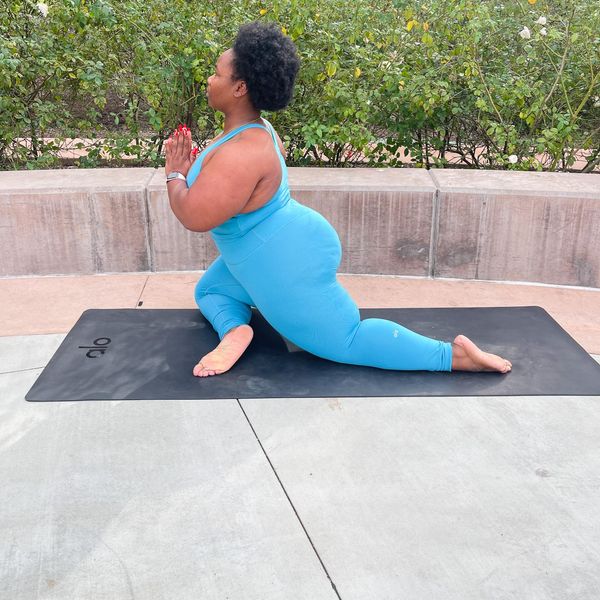How Tracee Ellis Ross Stays Radiant At 52: Her Best-Kept Fitness & Self-Care Secrets Revealed

In Tracee Ellis Ross, we trust.
The California-born diva continues to inspire us with her vibrant energy, unshakeable confidence, and dedication to self-care. As the actress and beauty mogul recently celebrated her 52nd birthday, it's the perfect time to reflect on the rituals that keep her glowing and joyful. Known for her love of fitness, mindful travel, and nurturing wellness routines, Tracee exemplifies the power of prioritizing self-care.
Now, more than ever, Black women need to be intentional about how we care for ourselves. Here, we’ll dive into some of her go-to practices that keep her grounded, radiant, and aging gracefully—a true icon of self-love and wellness.
Take the Moments
In an interview with PEOPLE, the founder of Pattern Beauty emphasized the importance of meticulous planning and organization in presenting one's best self. According to Ross, setting up her Pattern headquarters necessitates "mapping out with military precision" to ensure a successful and effective operation.
“That is perhaps both an escape and a defense mechanism, and also how I get it all done. But I take the moments: what I call it is being mindful and slow between A and B. So instead of rushing between things, I really allow myself to be present between them.”
The rich auntie continued, “I'm not sleeping well. One of my responses to menopause has been I just am not sleeping well, but sometimes I'm able to sleep in. And this morning I was able to sleep in. And then I wandered around the city. So I get to recharge by being able to sleep in when I can, by being a person in the world, by cooking for myself, by taking a bath, by connecting and being with my family, all of those things.
"I'm just like everybody else, just trying to find the fun things to do, watching TV, way too much TV on my iPad.”
Tracee's Holistic Approach to Fitness
Keeping the mind and body strong is a top priority for this one. In the realm of fitness, the black-ish star adopts the Tracy Anderson Method, a renowned technique favored by a number of celebrities. In 2017, she told PopSugar, “I feel sexy, and strong and beautiful when I’m working out. The movements are very dancer-esque, and I’ve been really enjoying it.”
The method combines strength-training mat classes with dance-cardio classes, aiming to reshape your muscles into long, lean, and robust ones. This approach is said to be based on two decades of scientific research conducted by Anderson, who has helped women of various body types achieve a dancer's physique.
According to Tracee’s trainer, Jason Walsh, they’ve been focusing on full body patterns, and “her goal is increasing her overall strength and muscle coordination,” he told Shape in 2022. “We are always focused on reinforcing her fundamental movement patterns.”
From weights to kettlebells to battle ropes, there’s nothing the Girlfriends alum won’t try. Tracee also incorporates Gyrotonics into her fitness routine, prioritizing balance, strength, and flexibility throughout her body. The Gyrotonic Method employs specialized equipment designed to enhance an individual's well-being by opening energy pathways, stimulating the nervous system, extending range of motion, and boosting strength and movement efficiency.
Her pre-workout meal: applesauce. “And I do not like applesauce at all. But I was told that that kind of pure, good-for-you sugar 15 minutes before a workout will make your workout more productive. Whether it works or not, I have no idea. But I suffer through eating the applesauce,” she confessed to The Wall Street Journal in 2022.
When it comes to her food, she makes most meals herself, even deeming herself the queen of the salad. It’s her way of loving herself which helps with avoiding sugar, dairy, and gluten. But if she wants a treat, she’s gonna have a treat. The actor told PopSugar in 2017, “I eat chocolate if I want chocolate. I’m a big salty person; I love olives, I love potato chips, I love French fries.”
Choosing Gratitude and Compassion for Her Body Over Judgment
Best of all, she is gentle with herself. During the pandemic, she got transparent about her journey. “With all the sharpness and harshness and violence and fear that has been around, perhaps the softness of my body is a blessing. It has been able to nurture me in a way that my mind could not... I really encourage and invite all of us to receive the wisdom of our bodies right now and allow the softness, the weight, the whatever — and be grateful. I made it through this year!"
Frequent Flyer
The enthusiastic globetrotter is collaborating with Roku to create a thought-provoking docuseries centered around the concept of solo travel. With her characteristic passion, Ross aims to honor and motivate individuals who embrace the unique journey of self-discovery, empowering them to live their lives authentically and courageously.
Tracee’s travel style combines comfort, practicality, and personal rituals to create a relaxed yet intentional experience. This is what we know from her interview with The Traveler.
Flying Attire: As an airport outfit, Tracee opts for “fancy sweats” by Pangaia, preferring oversized pieces with deep pockets and a hoodie for warmth. She also wears thigh-high compression socks to improve circulation.
Preparedness: She always carries a large tote and a roller bag with essentials, having learned from past lost luggage experiences.
Hydration & Health: Tracee challenges herself to drink at least two liters of water on flights to stay hydrated.
Comfort Over Everything
For vacations, she values sunlight-filled rooms and authentic local food, steering clear of overly experimental cuisine. She frequently revisits her favorite destinations, finding comfort in familiar places she knows well, including a longtime favorite in Mexico.
A bathtub is a must-have, helping her unwind upon arrival, while strong fragrances in hotel linens are a pet peeve due to her sensitive nose. She also likes to settle in by unpacking her bags and sanitizing her space.
Japan and Spain are top on her travel bucket list, and she hopes to visit soon.
Let’s make things inbox official! Sign up for the xoNecole newsletter for love, wellness, career, and exclusive content delivered straight to your inbox.
Featured image by Tracee Ellis Ross/Instagram
RELATED
Exclusive: Viral It Girl Kayla Nicole Is Reclaiming The Mic—And The Narrative
It’s nice to have a podcast when you’re constantly trending online. One week after setting timelines ablaze on Halloween, Kayla Nicole released an episode of her Dear Media pop culture podcast, The Pre-Game, where she took listeners behind the scenes of her viral costume.
The 34-year-old had been torn between dressing up as Beyoncé or Toni Braxton, she says in the episode. She couldn’t decide which version of Bey she’d be, though. Two days before the holiday, she locked in her choice, filming a short recreation of Braxton’s “He Wasn’t Man Enough for Me” music video that has since garnered nearly 6.5M views on TikTok.
Kayla Nicole says she wore a dress that was once worn by Braxton herself for the Halloween costume. “It’s not a secret Toni is more on the petite side. I’m obsessed with all 5’2” of her,” she tells xoNecole via email. “But I’m 5’10'' and not missing any meals, honey, so to my surprise, when I got the dress and it actually fit, I knew it was destiny.”
The episode was the perfect way for the multihyphenate to take control of her own narrative. By addressing the viral moment on her own platform, she was able to stir the conversation and keep the focus on her adoration for Braxton, an artist she says she grew up listening to and who still makes her most-played playlist every year. Elsewhere, she likely would’ve received questions about whether or not the costume was a subliminal aimed at her ex-boyfriend and his pop star fiancée. “I think that people will try to project their own narratives, right?” she said, hinting at this in the episode. “But, for me personally – I think it’s very important to say this in this moment – I’m not in the business of tearing other women down. I’m in the business of celebrating them.”
Kayla Nicole is among xoNecole’s It Girl 100 Class of 2025, powered by SheaMoisture, recognized in the Viral Voices category for her work in media and the trends she sets on our timelines, all while prioritizing her own mental and physical health. As she puts it: “Yes, I’m curating conversations on my podcast The Pre-Game, and cultivating community with my wellness brand Tribe Therepē.”
Despite being the frequent topic of conversation online, Kayla Nicole says she’s learning to take advantage of her growing social media platform without becoming consumed by it. “I refuse to let the internet consume me. It’s supposed to be a resource and tool for connection, so if it becomes anything beyond that I will log out,” she says.
On The Pre-Game, which launched earlier this year, she has positioned herself as listeners “homegirl.” “There’s definitely a delicate dance between being genuine and oversharing, and I’ve had to learn that the hard way. Now I share from a place of reflection, not reaction,” she says. “If it can help someone feel seen or less alone, I’ll talk about it within reason. But I’ve certainly learned to protect parts of my life that I cherish most. I share what serves connection but doesn’t cost me peace.
"I refuse to let the internet consume me. It’s supposed to be a resource and tool for connection, so if it becomes anything beyond that I will log out."

Credit: Malcolm Roberson
Throughout each episode, she sips a cocktail and addresses trending topics (even when they involve herself). It’s a platform the Pepperdine University alumnus has been preparing to have since she graduated with a degree in broadcast journalism, with a concentration in political science.
“I just knew I was going to end up on a local news network at the head anchor table, breaking high speed chases, and tossing it to the weather girl,” she says. Instead, she ended up working as an assistant at TMZ before covering sports as a freelance reporter. (She’s said she didn’t work for ESPN, despite previous reports saying otherwise.) The Pre-Game combines her love for pop culture and sports in a way that once felt inaccessible to her in traditional media.
She’s not just a podcaster, though. When she’s not behind the mic, taking acting classes or making her New York Fashion Week debut, Kayla Nicole is also busy elevating her wellness brand Tribe Therepē, where she shares her workouts and the workout equipment that helps her look chic while staying fit. She says the brand will add apparel to its line up in early 2026.
“Tribe Therepē has evolved into exactly what I have always envisioned. A community of women who care about being fit not just for the aesthetic, but for their mental and emotional well-being too. It’s grounded. It’s feminine. It’s strong,” she says. “And honestly, it's a reflection of where I am in my life right now. I feel so damn good - mentally, emotionally, and physically. And I am grateful to be in a space where I can pour that love and light back into the community that continues to pour into me.”
Tap into the full It Girl 100 Class of 2025 and meet all the women changing game this year and beyond. See the full list here.
Featured image by Malcolm Roberson
This Is How To Keep 'Holiday Season Stress' From Infecting Your Relationship
Hmph. Maybe it’s just me, but it seems like there is something really weird happening in the fall season air (because winter doesn’t officially begin until December 21) that cuddle season is in full swing while break-up season is as well. In fact, did you know that break-ups are so popular during the holiday season that December 11 is deemed Break-Up Day?
The reasons why relationships shift around this time vary; however, I did both roll my eyes and chuckle when I read that a very popular one is because it’s an easy way to get out of getting one’s significant other a Christmas present. SMDH.
Anyway, I personally think that the less shallow folks out here may contemplate calling things “quits” or they at least distance themselves a bit from their partner (and what I’m referring to is serious relationships) due to all of the stress and strain that oftentimes comes with the holidays whether it be financial, familial, due to their tight schedules or something else.
Listen, I would hate for you and your man to miss the fun and happiness of experiencing this time of year, all because you are so overwhelmed or irritated that you can’t really enjoy it. That’s why I have a few practical tips for how to avoid allowing the typical holiday season stress from INFECTING your relationship.
Manage Your Expectations
 Giphy
GiphyUnmanaged expectations. If there is a main reason why the holiday season tends to be so stress-filled for so many people, I’d bet good money that this is the cause. And when you’re in a long-term relationship, expectations can manifest themselves in all sorts of cryptic and/or unexpected ways. You might have relatives who assume that you are going to be with them for Thanksgiving or Christmas when you have other plans in mind. You might be thinking that you are going to spend one amount for presents while your man is thinking something totally different. When it comes to scheduling, your signals may be crossed.
And you know what? To all of these scenarios, this is where clear and consistent communication come in. Don’t assume anything. Don’t dictate anything either. From now until New Year’s, mutually decide to check in once a week, just to make sure that you are both on the same page as it relates to the holidays and what you both are thinking will come along with it. The less blindsided you both feel, the less stressed out you will be. Trust me on this.
Set (and Keep) a Budget
 Giphy
GiphyOkay, so I read that last year, 36 percent of Americans incurred some type of holiday-related debt. Hmph. Last year, there was still some sense of normalcy in this country, chile, so I can only imagine what finances are gonna look like over the next several weeks. That said, since I don’t know a lot of people who don’t find being broke stressful, make sure that you and your bae set a budget and then stick to it this year — no ifs, ands or buts.
Because really, y’all — it doesn’t make sense to deplete savings and/or max out credit cards for a few days of giggles only to be damn near losing your mind because you don’t know how to make ends meet come Dr. Martin Luther King, Jr. Day.
And by the way, this tip doesn’t just speak to things like food and gifts; I also mean travel. If it doesn’t make a ton of sense (or cents) to be all over the place this year — DON’T BE.
Keep Matthew 5:37 at the Forefront
 Giphy
GiphyIf off the top of your head, you don’t know what Matthew 5:37 says, no worries, here ya go: “But let your ‘Yes’ be ‘Yes,’ and your ‘No,’ ‘No.’ For whatever is more than these is from the evil one.” That verse right there? Oh, it’s a boundaries lifesaver! I say that because do you see “maybe” or “I’ll think about it” in there? Nope. LOL. It says that you should tell people “yes” or “no” and leave it at that — and that complements Anne Lamott’s quote, “’No’ is a complete sentence” impeccably well. Yeah, you’ve got to remember that anything beyond a yes or no to a request is privileged information; you don’t owe anyone details or an explanation.
Besides, if you are really honest with yourself, when someone asks you something and you give a “Umm, let me think about it” kind of reply, more times than not, you already know what your answer is going to be — so why not let you both off of the hook? Give your response. Commit to that. And let everyone (including yourself) get on with their lives and schedules.
I promise you that when it comes to those holiday parties, you are pissing more folks off by not RSVP’ing or doing so and not showing up than just saying, “Thank you but not this year” off the rip.
Remember That Your Personal Space Is Privilege Not a Right
 Giphy
GiphyA friend of mine recently bought a new house and invited me over to come see it. He’s a single man with no children, so as I was taking in all of the space that he had, especially as I walked through his finished basement, I joked about relatives coming to live with him. “Hell no” and “absolutely not” were pretty much his immediate responses as he went on to say that some folks even had the nerve to be offended when he told them that he had no intentions on taking DNA in.
Ain’t it wild how people think that your stuff is their right? And yes, that brings me to my next point. Your home is your sanctuary space. If you want to host folks this year — cool. If not, ALSO COOL. Please don’t let folks (family included) guilt you into how they want you to act or even into what they would do if the shoe was on the other foot. You are not them — and as one of my favorite quotes states, “If two people were exactly alike, one of them would be unnecessary.” (A man by the name Larry Dixon said that.)
Hell, my friends? They know that I am good for sending them random things that they need or even want all throughout the year. Coming over to hang out at my pace, though. Uh-uh. Chalk it up to being a card-carrying member of the ambivert club yet I like keeping my living space personal — and I sleep like a baby, each and every night, for feeling that way.
Always remember that your space, your time, your resources, your energy and shoot, yourself period (including your relationship), are all things that are your own. You get to choose how, when and why you want to share them. The holiday season is certainly no exception.
Cultivate Some “You Two Only” Traditions
 Giphy
GiphyIt’s not uncommon for some couples to hit me up after the holiday season to “detox.” Sometimes it’s due to the financial drama (and sometimes trauma) that they experienced. Sometimes it’s because they allowed their relatives (especially in-laws) to get more into their personal business than they should’ve. More than anything, though, it tends to be because they didn’t get enough quality time together and so ended up feeling “disconnected.”
Please don’t let that happen. Listen, I’m not even a holidays kind of woman and yet, I will absolutely sit myself down with some hot chocolate and chocolate chip cookies to enjoy a Hallmark holiday film or two. Aside from the fact that most of them are lighthearted and sweet, I also like that they usually focus on couples loving on each other amidst all of the holiday beauty and ambiance — which is something that all couples should set aside some time to do.
Maybe it’s a vacation. Maybe it’s a staycation. Or maybe it’s my personal favorite, A SEXCATION. Whether it’s for a few days, the weekend or even overnight — don’t you let the holidays go by without setting aside time for you and your man to celebrate one another. Don’t you dare (check out “Are You Ready To Have Some Very Merry 'Christmas Sex'?”).
GET. SOME. REST.
 Giphy
GiphyI once read that 8 out of 10 people get stressed out over the holidays and 3 out of 10 lose sleep during to it — and when you’re stress-filled and sleep-deprived, that can absolutely lead to hypersensitivity, making mountains out of molehills and even not being in the mood for sex.
Your relationship can’t afford to go through any of this, so definitely make sure to prioritize rest. I don’t care how unrealistic it might seem during this time, sleep should never be seen as a luxury; it will always and forever be a great necessity.
That said, try to get no less than six hours of shut-eye in (check out “6 Fascinating Ways Sex And Sleep Definitely Go Hand In Hand”) and even ask your bae to take a nap with you sometimes (check out “Wanna Have Some Next-Level Sex? Take A Nap, Sis.”). Not only will sleep help to restore your mind, body and spirit but, when it’s with your partner, it’s an act of intimacy that can make you both feel super connected, even in the midst of what might feel like chaos.
___
Holiday season stress is real. Still, never give it the permission or power to throw your relationship off. Put you and your man first and let the holidays be what they are gonna be, chile.
Let’s make things inbox official! Sign up for the xoNecole newsletter for love, wellness, career, and exclusive content delivered straight to your inbox.
Featured image by Shutterstock









